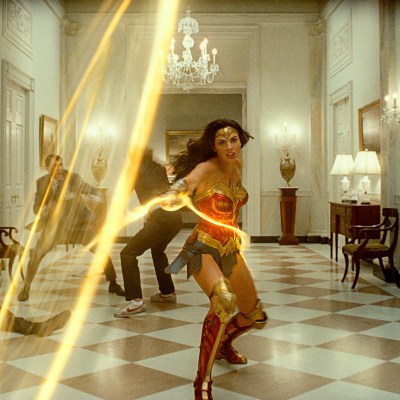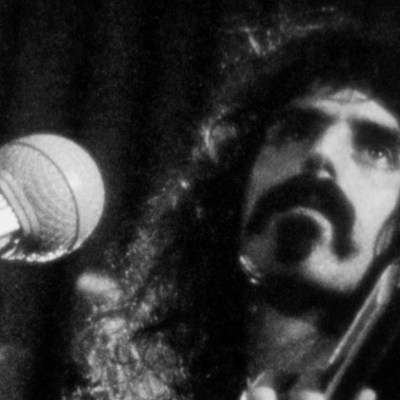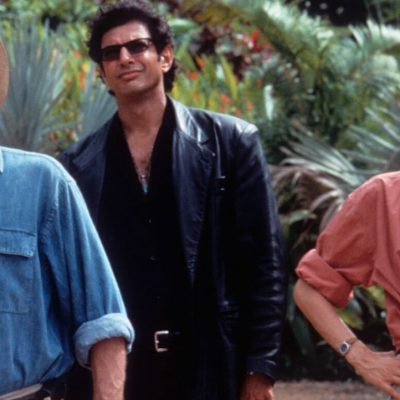Why The Bee Gees Were More Than Saturday Night Fever
Generations of music fans know the Bee Gees — British-born, Australia-based brothers Barry, Robin and Maurice Gibb — as the musical act that created the songs for Saturday Night Fever, the 1978 movie that made John Travolta a star and catapulted what was known at the time as “disco” music to the forefront of pop culture.
But not only did the Bee Gees create indelible dance staples like “Stayin’ Alive,” “Night Fever,” and “More Than a Woman,” but they had an entire career before Saturday Night Fever, one which was launched in the 1960s and yielded pop classics like “How Do You Mend a Broken Heart,” “To Love Somebody,” “Massachusetts,” “I Started a Joke,” and more, before their gradual turn toward R&B and dance with hits such as “Jive Talkin’” and “Nights on Broadway.”
Along the way, the Bee Gees broke up, battled each other and various addictions, went through dizzying career ups and downs, wrote hits for other artists and succumbed to tragedy, with Robin, Maurice, and younger brother Andy (who started as a solo act before joining his siblings in the Bee Gees) passing away in 2012, 2003 and 1988 respectively.
They also experienced one of the most vicious backlashes in pop history as the tide turned against disco by the end of the 1970s — a backlash that may have been fueled by racism and homophobia as well as the oversaturation of the market.
Now the entire story of the Bee Gees has been chronicled in an excellent new documentary, The Bee Gees: How Can You Mend a Broken Heart, which premieres this weekend on HBO in the US and Sky Documentaries in the UK. The film is directed by Frank Marshall, the legendary producer whose own track record with Amblin and his own Kennedy/Marshall Company includes films such as the Indiana Jones series, the Back to the Future trilogy, Poltergeist, the Jurassic Park/World saga, Who Framed Roger Rabbit?, Arachnophobia (which he also directed), The Sixth Sense and many more.
Den of Geek had the privilege of speaking with Marshall about his own view of the Bee Gees, working with Barry Gibb and the families of the other brothers, their place in pop culture and more.
Den of Geek: I went into this film not being a particularly huge Bee Gees fan, but certainly knowing who they are and knowing certain parts of the legacy like Saturday Night Fever. I came out of it wanting to get all those early albums and just fascinated by their whole story.
Frank Marshall: Well, thanks. It was an extraordinary journey. That’s what I love about documentaries, you don’t know where you’re going, unlike my day job where I know everything I’m doing that day. This was such a great journey of discovery and so I’m glad you enjoyed it.
I read that your father was a musician and you play guitar yourself, so music has always been an important part of your life.
Yeah. That was the connection here, that I grew up in a musical family. My dad was a guitar player and conductor and composer. He was actually under contract at Capitol Records. So there was a lot of connective tissue that went into this. So it kind of made sense to me. It was kind of natural.
What was your first exposure to the Bee Gees and what was it about them that struck a chord for you, so to speak?
When I thought back I knew their early songs because I grew up obviously in the ’60s, ’70s, but they really didn’t have an impact for me until Saturday Night Fever. I was shooting The Warriors, which was also at Paramount, and so it was a big deal to have this movie soundtrack suddenly become such a giant success. That was my first realization that they were pop superstars. The music from the movie was incredible. The songs were all different and really fit to the movie. Then to find out later, when I’m doing this doc, that none of it was planned, that’s incredible.
I love that portion of the documentary where it comes out that some of the execs at Paramount at the time were looking down at the “little disco movie” and had no idea what it was going to become.
Certainly, at that moment I happened to be at Paramount when that was going on. We were doing The Warriors, and I remember hearing about a little disco movie. John Travolta was a TV star. Nobody saw this coming.
What inspired you to do a film about the Bee Gees? You worked with Martin Scorsese on The Last Waltz, which is a very different film, but in terms of how to make a great music documentary was that an inspiration?
Well, Marty’s kind of an inspiration for whatever you want to do. But I’ve always loved documentaries. I’ve never really had the opportunity to do them just because they take so long and they’re so involved, and I’ve had my day job. But we started dabbling. I directed my first short doc about 10 years ago and I really loved it, but it was only 50 minutes and it was a very specific subject. We’ve kind of been dabbling in them and then Kennedy/Marshall, about five, six years ago, started really making them.
I was over at Capitol Records meeting with the head, a fellow named Steve Barnett, who had just remodeled and refurbished Capitol Records. I was marveling at how fabulous it was and it reminded me of my early days with my dad and being there and everything. So we started talking about documentaries or stories that might be told at Capitol.
He said, “Well, I just acquired the Bee Gees catalog. We want to try some to do some things to reintroduce and reinvigorate the catalog, and we think a documentary would be great.” I said, “Hey, I’m in. I’ve always thought there were an amazing group and I’d love to get into how that all came about.” So it was being in the right place at the right time for me, and that was four years ago.
What would you say is the secret to a good documentary?
I think you have to dive deep. I think it can’t be superficial and you can’t tell a story that people know. I think you really have to dig deep into the characters to find that. You start with a general arc and for me it was the family and this gift of creativity that they had. But where did it come from?
The reason I went and got Nigel Sinclair to produce this was I looked at the fabulous doc that he did with Ron Howard on the Beatles and I said, “If they can find footage that had never been seen before of the Beatles then he can help me find footage for this.” It has to be one of those things that had never been seen before.
It needs to have some weight to it. As they say, it needs to be authentic, it needs to be real. You can’t pull wool over people’s eyes. They know if it’s a puff piece. This one, it has its ups and downs. It’s got its joyous moments but there’s also some tragedy. It’s happy and sad. So I think that it really makes for the right story and it’s right for a documentary.
Were Barry Gibbs and the families of the other brothers up for it from the start, or did it take some convincing?
Well, it started with Barry. I met Barry when he came out here for the Grammy tribute and we kind of hit it off, I think, because I’m the oldest in my family, I have younger brothers, and we both grew up in a musical family. So we shared a lot of commonality. You have to get to know each other. I traveled down to Miami several times where we’d just talked. We didn’t shoot, we didn’t do any interviews. Then he introduced me to the rest of the family. Obviously, he was blessing the project and he just felt it was just the right time.
Was one of your goals to show people that the Bee Gees were more than Saturday Night Fever? There may be generations who don’t even know that they sang “How Can You Mend a Broken Heart” or “Massachusetts” or any of those other songs.
Yeah, I think it was really to reintroduce them to fans, but also introduce the younger generations of music buffs and music fans to who they really are. We’re really celebrating their legacy and what incredible songwriters they were.
They were this group that everybody knew, but I have two 20-year-old daughters and when I started putting on songs like “Islands in the Stream” and “Guilty,” they go, “Oh yeah, Barbra Streisand wrote that,” or “That’s Dolly Parton.” I said, “No, it isn’t. This is the Bee Gees.” They go, “What?” So, you’re right. There are all these songs that people know, but they don’t realize the songwriting gifts that the Bee Gees had as well.
One of the most shocking moments in the film was the Disco Demolition Night and the analysis of it by Vince Lawrence, who was a security guard at Comiskey Park for that event. When he started talking about pulling the Isaac Hayes and Al Green records out of the bonfire, that just blew me away. And the backlash against the Bee Gees was unbelievably intense.
When you delve into what was that about, I remember it but you don’t understand the impact society was having on music in those days and on the career of these guys. They were on the front wave of global superstardom. It wasn’t just local superstardom. They didn’t understand what was happening. They were just caught up in the changes and trends happening in society and the music was reflecting that. It’s the same kind of backlash that’s happening today about what you believe in.
First of all, they weren’t disco artists. They got labeled that. But, as you know, they were R&B, they were rock, they were so many other things, but they got labeled as this and then they got blamed for it. It wasn’t their fault. It was really unfair. It was that thing that we talk about in the movie that so often happens to superstars. Now, we understand it but back then they didn’t. So we went to explore why and that’s when we found Vince and we found Nicky Siano to really set and authenticate what was going on.
Nicky (a resident DJ at Studio 54 during the disco era) mentions in the doc how disco became such a success that the music industry basically oversaturated the market with it, which I think is also something you see in the film business. A superhero movie becomes big, so let’s shove 10 more superhero movies out there as soon as possible.
I think Nicky says it, it’s about greed. They lose sight of why it’s successful and then oversaturate and then people get angry and there’s a backlash. The Bee Gees were writing other songs as well, but it was that huge reaction to Saturday Night Fever that wasn’t their fault, but they got blamed for it.
When you meet a Barry Gibb, or work with Steven Spielberg or even Orson Welles, as you did early in your career, is there something different about their personalities, the way they look at the world that ties them together as these creative visionaries?
Well, yes, I guess. They’re all perfectionists. They don’t let it go until it’s out the door and they’re made to let go. That’s the commonality. What’s amazing to me, particularly in the case of the Bee Gees, was that Barry was a collaborator. He took this input from everybody around him and that’s what created the musicality that came into their songs. It wasn’t just one thing.
He took ideas from here and from there and said, “Give us a riff over there or play that thing that you played last night.” He remembers it and that was all the creative process for him and he was natural. I think that’s what I see with Steven and certainly with Orson and with Barry is that it came naturally. It’s not work. They’re just naturally creative and that’s really the gift.
What would you like people to take away from seeing this, either brand new fans or older fans?
Well, I think it’s about the longevity and the fact that they were loving brothers. It was complicated, families are complicated, but their incredible musical gift and the impact that they’ve had on the pop music culture should not be underestimated. I think that’s what I want to do, is celebrate their legacy and hopefully people will rediscover them and discover them anew.
This interview has been edited for length and clarity.
The Bee Gees: How Can You Mend a Broken Heart premieres this Saturday (December 12) on HBO in the US and on Sunday (December 13) via Sky Documentaries in the UK.
The post Why The Bee Gees Were More Than Saturday Night Fever appeared first on Den of Geek.
From https://www.denofgeek.com/culture/why-the-bee-gees-were-more-than-saturday-night-fever/





